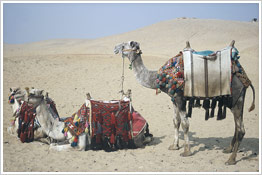The Importance of Camels
By Marjorie Foerster Eddington
Question
What was so special about camels that Abraham's servant prayed that the girl who Isaac should marry would water his camels?
Answer
 Let's put this question into context. Abraham wanted to make sure that before he died, he found a wife for his son Isaac from among his kinsfolk and not from the local people. It was incredibly important to him, and he made his trusted servant take an oath to carry out his wishes. When this most trusted servant arrived at the town of his kinsfolk, he prayed. This is part of the prayer: Let's put this question into context. Abraham wanted to make sure that before he died, he found a wife for his son Isaac from among his kinsfolk and not from the local people. It was incredibly important to him, and he made his trusted servant take an oath to carry out his wishes. When this most trusted servant arrived at the town of his kinsfolk, he prayed. This is part of the prayer:
May it be that when I say to a young woman, 'Please let down your jar that I may have a drink,' and she says, 'Drink, and I'll water your camels too'—let her be the one you have chosen for your servant Isaac." (Gen 24:12-14 NIV)
So, what's the big deal about the camels? First of all, the presence of camels at that time period was exceptional, and a bit problematic to some. Archaeological evidence reveals that the camel was not domesticated as a "beast of burden" until much later. But Nahum M. Sarna explains that there was no reason to insert camels into the story here or when Abraham was in Egypt, where biblical writers say Abraham received the camels (Gen 12:16).
Sarna continues to explain that some bilingual texts reveal there is reason to believe that a "wealthy man might acquire a few [camels] as a prestige symbol for ornamental rather than utilitarian purposes" and would use them "where wealth and honor need to be displayed," as in this situation of finding a wife for his son, Isaac (JPS Torah Commentary 96).
Not only would ten camels show off Abraham's wealth, it would also present quite a challenge to the person watering them. John H. Walton explains in The NIV Application Commentary:
A camel that has gone a few days without water can drink as much as twenty-five gallons. Ancient jars used for drawing water usually held no more than three gallons. In other words, this offer involves perhaps from eighty to a hundred drawings from the well. Such an unbelievable proposal would indicate that God is working to override human nature in specified ways. (530)
Sarna adds, "It takes a camel about ten minutes to drink this amount of water" (JPS Torah Commentary 164).
The fact that Rebekah (who is Abraham's kinsman, Isaac's cousin once removed) offers, on her own, to water the camels, is quite exceptional. She displays true unselfishness, service, and kindness to a man she has never met. These qualities bespeak a great character. Rebekah is indeed worthy to be Isaac's bride and become the next matriarch. So, she comes back riding the camels -- a sign of honor -- to meet Isaac, who is waiting for her at home (Gen 24:61-67). |

